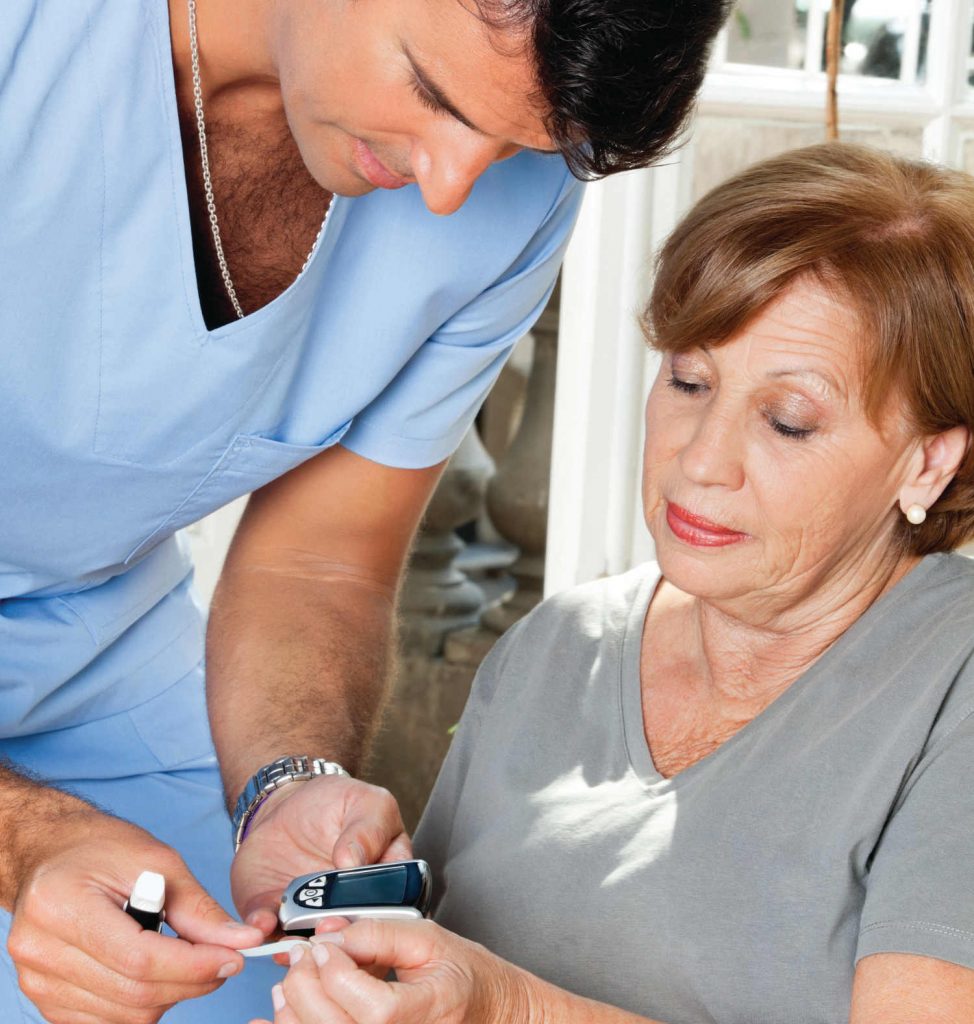Touro Diabetes Center
Providing Education, Support and Hope

When diagnosed with diabetes, some people feel scared, sad or overwhelmed. But according to Valerie Burton, RN, CDE, there is a way to get this life-changing illness under control by learning to be proactive.
As manager and diabetes educator of the Touro Diabetes Center, Burton is familiar with how the diagnosis of diabetes affects patients. “Many patients who are diagnosed lose hope,” Burton says. “For some, they think life is over until we teach them how they can take control and change the way they live.”
Burton, who is a diabetic herself, understands how hard the mental adjustment can be. When she was first diagnosed with diabetes in 2005, she had trouble keeping her blood sugar under control. “For about a year after my diagnosis, I was struggling,” she says. “But then a nurse co-worker mentioned that I should come work at the Diabetes Center, and that is when my life changed.”
After Burton earned her Associate of Science degree in Registered Nursing at Delgado Charity School of Nursing, she began her 23-year career at Touro and has managed the Diabetes Center for the past 6 years. “I meet a lot of patients who have, for one reason or another, not had the education needed to get their diabetes under control,” Burton says. “When I was first diagnosed, I thought I knew everything there was to know. Once I completed the training to become certified as a diabetes educator, I realized how much more there was to learn.”
After Diagnosis – Education and Support
Doctors at Touro refer new or existing patients to the Diabetes Center if they have uncontrolled blood sugar or have been diagnosed with Type 1, Type 2 or gestational diabetes. Then the team of educators at the center, who are certified through the National Certification Board of Diabetes Educators and the American Diabetes Association, work closely with the physicians to identify each patient’s specific needs and help them develop the self-management skills needed to control their disease.
Patients are then encouraged to take part in the Touro Diabetes Center’s comprehensive educational program. The four sessions include:
• An Overview of Diabetes – Including an explanation of the different types of diabetes and advice on how to monitor glucose levels.
• Meal Planning and Weight Control – Lessons on how to maintain a nutritious, balanced diet; portion control; and watching carbohydrate intake.
• Physical Activity and Healthy Coping – How to set up a daily routine of physical exercise and keep stress at a minimum.
• Prevention, Detection and Treatment of Long-Term Complications – How to look for early signs of diabetes, and how to deal with complications and emergencies.
“The Diabetic Center provides an amazing source of information for our patients,” Burton says. “We not only teach patients how to monitor their diabetes and make healthy choices, we also teach them to detect changes, interpret lab values and be a part of their own daily health team.”
Preventing Long-Term Complications
The latest research indicates that the long-term complications of diabetes are not inevitable and that it may be possible to minimize complications and/or prevent them altogether. The most common long-term complications of diabetes include:
Heart disease – known as cardiovascular disease
Kidney damage – known as nephropathy
Eye damage – known as retinopathy
Nerve damage – known as neuropathy
Strokes
Limb amputations – particularly lower leg amputations
The good news is that according to the American Diabetes Foundation, with the correct treatment and recommended lifestyle changes, many people with diabetes can prevent or delay the onset of complications. “Education is the key,” Burton says. “At the Diabetes Center, we teach our patients to look for signs that something is not right.” Long-term complications can be prevented or delayed by:
Keeping blood sugar under control
Engaging in regular physical activity
Eating a healthy diet
Attending all diabetic reviews and screenings
Cutting down or avoiding smoking
Cutting down or avoiding alcohol
Taking care of your feet and monitoring them for signs of poor circulation
Taking care of your teeth and monitoring them for signs of redness or swelling
Managing stress so that your insulin will work properly
Through the Diabetes Center, Touro offers outpatient and inpatient education, provides monthly support groups, and participates in community service events and citywide health fairs to provide screenings for diabetes. “The success of our diabetic education program is measured by the results in people’s lives,” Burton says. “I have watched as patients come to the center, depressed or stressed out about their diagnosis and then leave with hope. I have seen amazing things happen here — patients who learned to control their blood sugar and weight, through eating healthy and exercise. Patients who hated exercise but after learning how critical it is to their health, started exercising, feeling better and sleeping better.”
Insurance Coverage and Scheduling Your First Appointment
Medicare and most major insurers cover diabetes education and support services when medically necessary. A physician’s order must first be completed, signed and faxed to the Diabetes Center at (504) 897-7121. For more information or to speak with a diabetes educator, please call (504) 897-8813 or e-mail Valerie Burton, RN,CDE at [email protected].
